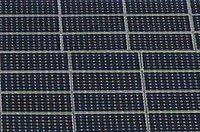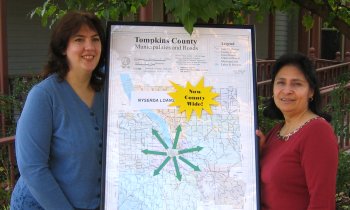- By Dan Veaner
- Around Town
 Print
Print 
Photovoltaic solar panels
The program is a result of INHS partnering with the New York State Energy Research and Development Authority (NYSERDA ) to provide loans and grants to homeowners of all incomes within Tompkins County. The loans are specific to high efficiency heating systems, insulation, replacement windows, Energy Star appliances, and solar or geothermal energy systems. At a fixed rate of only 2% for up to a 10 year term, the loans make transforming your home to save energy more affordable than buying a car. The interest rate is actually 6%, but NYSERDA buys it down to 2% to help achieve that organization's mission of reducing the state's petroleum consumption. Monthly payments are typically under $200, and Webster notes that most clients payments are much less.
INHS was one of the first two nonprofit organizations to sign an agreement with NYSERDA to offer the low loan rates. What made it a good fit was that INHS has the resources to offer financial counselling as well as a 'rehab staff' that inspects an applicant's house and provides education on what technologies and home improvement projects have the best payback as well as the best efficiency. For example, Webster says it typically takes 20 years for windows to pay for themselves in energy savings, while insulation has a much faster return.
INHS also helps homeowners with some of the typical headaches of having work done on your home. "We make sure that the work gets completed in a timely manner," says Garcia. "We make sure the contractors are doing what they're supposed to be doing. So we're right there."
In the past going green was something people did when they thought it was the right thing to do, or were made to feel guilty. With the rising cost of energy and the falling cost of green technologies, more homeowners are looking at green technologies as a way to save money. "We were doing it all along," Garcia says. "But we wanted to focus on energy improvements and make people realize that's what we're doing. We wanted to make sure that they understood that energy efficient work really saves them money in the long run. Especially with the headlines about energy-efficient work, gas prices going up. We came in just at the right time."
Webster notes that INHS has been recycling houses for 30 years. "That's definitely a green initiative," she says. "It's just that people didn't think of it that way. We were promoting living in the city where people could get around without cars, and putting buildings back into good shape that might have been torn down. Although 30 years ago people weren't necessarily thinking of that in terms of protecting the environment, now everybody sees that it fits right in."
INHS began its Energy Smart Loans program five years ago, with recipients only within the boundaries of the City of Ithaca. Last Spring they expanded the program to encompass all of Tompkins County. But with a such a strong identification with the city, Webster says they have had a hard time getting the message across that the program is county-wide and not restricted to low-income homeowners. In the past year between 40 and 60 people have benefited from the program, upgrading insulation, furnace and boiler replacements, window replacement, and water heaters.

Pamela Webster (left) and Diana Garcia
Wind turbines are also eligible for the program. "They might not be effective in the city," Webster says. "But they could be for someone in Lansing. And photovoltaic panels could be included in this as well. We've been doing a few of those mostly in the city. People who live in rural areas where they don't have a lot of buildings around them might even benefit more."
Some program participants have installed photovoltaic solar electric systems. Webster says a current client is in the throes of a $20,000 solar panel project, but will only pay about $7,000. "They're borrowing that at 2% interest," she says. "They qualified for a grant to cover up to $5,000 worth of it, and they got credits. And at least this year we can get credits on our taxes from the federal government."
Both women work directly with clients to determine their needs, help find the best solutions, and helping with the application process. Garcia says her favorite part of the job is working with clients and showing them how they can save energy and money. Webster says that most people do qualify for the loans, because the organization is looking for opportunities for energy savings. The loan is actually a mortgage, or a secured loan. Garcia says it is done that way to comply with NYSERDA's requirements.
"Out primary mission is to help modest income homeowners, and that's still what we do," Webster says. "For a single parent or somebody who is not making a lot of money, being able to reduce their energy bills by 30% is real money in their pocket. For some folks that might be $90 a month more in their pocket every month."
----
v3i44



